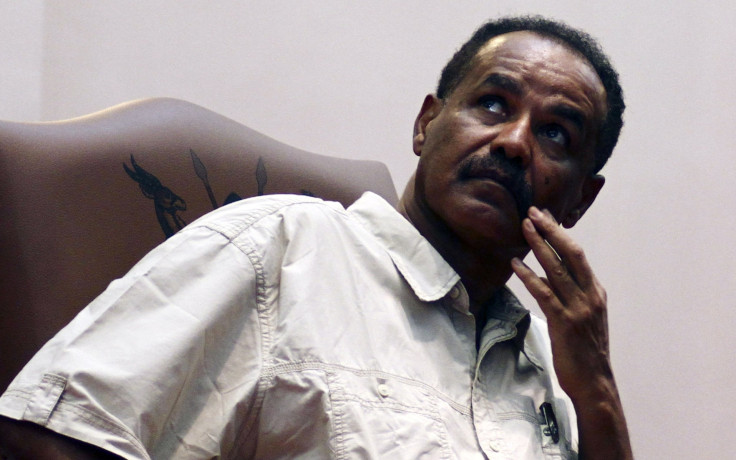In Eritrea, Whispers Of A Quiet Protest Challenge Years Of Suppression

Something strange happened Monday morning in Asmara, the capital city of Eritrea, an African nation of about 5.5 million people on the southwestern shores of the Red Sea.
Reports emerged of a coup attempt at the Ministry of Information, around 10 a.m., but the turmoil was kept quiet. For most people in Asmara, the work week commenced without a hitch. The MoI website itself doesn’t even hint at the unrest; the top story, posted on Sunday, details development initiatives in the port town of Massawa.
But Western news outlets including Reuters, the New York Times and the Associated Press reported that anywhere from 100 to 200 mutinous soldiers stormed the MoI and forced a newsreader to deliver a statement on air calling for the release of political prisoners, as well as the enforcement of a constitution that was officially approved in 1997 but never implemented. That constitution sets a two-term limit for presidents, ensures the right to a fair trial and lays out guidelines for a free media -- none of which actually exist in Eritrea.
Eritrea is a young country; it broke away from Ethiopia and officially claimed independence in 1993, ending decades of bloody warfare. That was a time of hope, but the international community’s assessment of Eritrea’s potential has since soured.
War didn’t really end with sovereignty; Eritrea has since engaged in clashes with Ethiopia and Yemen. It has also been accused of funding militants in Somalia, which earned Asmara sanctions from the United Nations. The same man -- President Isaias Afwerki -- has ruled the country for decades, and no general election has been held since the independence referendum of 1993. Thousands of political prisoners are currently being held in secretive detention, according to Human Rights Watch.
In short, Eritrea is considered one of the most isolated and repressive states on earth. And although the people who stormed the MoI on Monday apparently made some progress, security forces didn’t take long to quash the small uprising.
It is no surprise that reports of the incident are hard to come by. Eritrea is known for muzzling its press; a 2012 report from the Committee to Protect Journalists ranked the country the worst on earth in media censorship, beating out such heavy contenders as North Korea, Cuba and Saudi Arabia.
Then again, that’s only one side of the story.
The Monday morning incident sparked furious sparring on social media, with many defenders of the government -- including Eritreans native to Asmara -- insisting that they had seen no sign of an uprising, and further, that no uprising was necessary. A few cited this video, from Iranian news outlet PressTV, which challenges the Western narrative about Eritrean suppression. (A similar film making the counterpoint can be found here, from Al Jazeera.)
The online sparring and the still-murky reports of the Monday uprising raise a vital question: after decades under President Afwerki -- and in the context of regional uprisings of the Arab Spring -- is Eritrea due for a revolution?
With on-the-ground reporting at a minimum, analysts are in large part forced to speculate about this recent conflict. Some approach the problem scientifically -- like Jay Ulfelder, an American political scientist affiliated with the Ronin Institute for Independent Scholarship.
Ulfelder uses a mathematical model to forecast the probability of successful coups in countries around the world. His 2012 forecasts successfully pegged Mali and Guinea-Bissau as high risk nations, and the 2013 rankings came out last month.
Neither forecast puts Eritrea among the top 30 “high-risk” coup contenders.
“As for what shapes the forecast for Eritrea in particular, it winds up toward the middle of the global pack because it's a mixed bag,” says Ulfelder.
“On the one hand, it's a poor country that's internationally isolated, both of which are associated with increased risk of coup attempts. On the other hand, it's a very repressive dictatorship, and regimes like that are historically no more coup-prone than fully democratic ones, other things being equal. The regime's success at quashing dissent is also reflected in the absence of any prior coup attempts, another thing that pulls Eritrea's forecast down.”
The model is so far holding up, since what happened in Eritrea on Monday was not a coup; it did not depose the government and was possibly not intended to do so.
But even mutiny is a big deal for this country, where dissent so often leads to a prison cell. Any signs of bold opposition are worth noting in an environment like this.
Monday isn’t the first time Eritreans have acted brazenly against the regime; in 2009 and again in 2011, members of Eritrean soccer teams on international tours embarrassed Asmara by refusing to go home after touring abroad. In 2012, two military pilots made a spectacular escape to Saudi Arabia with an airplane belonging to Afwerki. Escape is so common that it has turned into a lucrative racket; HRW cites a UN report finding that officials can make thousands of dollars by assisting and charging escapees, and “people smuggling is so pervasive that it could not be possible without the complicity of government and party officials, especially military officers.”
A worsening economic crisis may be what’s pulling Eritrea closer to the brink. The UN sanctions are being felt more than ever, especially in a country where the GDP per capita is around $482, according to World Bank data.
All told, it is probably too early to expect a major uprising from the citizens of this long-suffering country. But little rebellions like the MoI mutiny -- and even the fact that some details emerged despite heavy censorship -- show that the winds of change may come sooner than we think.
© Copyright IBTimes 2024. All rights reserved.






















